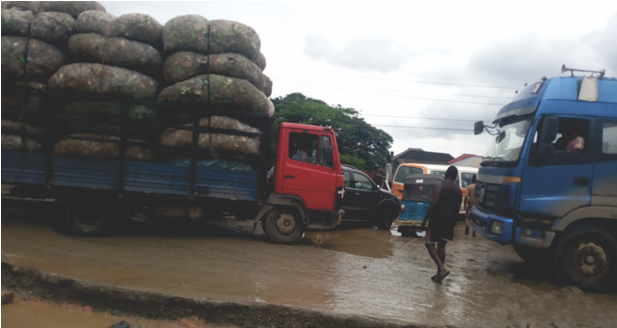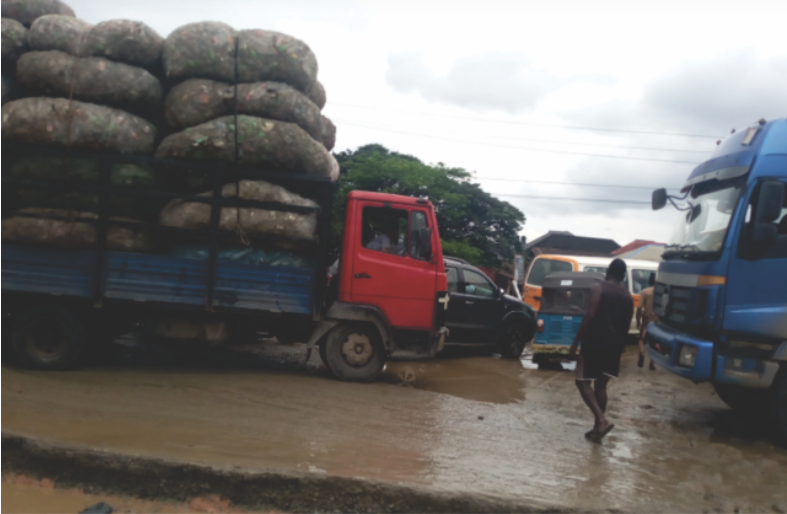It’s getting to one year now since the Federal Government of Nigeria promised to reconstruct the Eleme Junction/Trailer Park axis of the East-West road to ease traffic on that road and cut down the suffering that commuters, motorists, workers, school children and industrial concerns that ply that road go through. Nothing has happened yet. And with the setting in of the rains, users of the road fear that they may go even through more tortuous times on that section of the road.

The situation on the road got so bad last year that youths, civil society organisations, women, cultural organisations and even the local government leadership in the areas affected by the deplorable condition of the road poured out into the road and blocked it to traffic for seven consecutive days.
Although labour unions and corporate organizations operating in that axis did not physically join the protest, a lot of them gave their support like the Port Harcourt zonal chairman of the Petroleum and Natural Gas Senior Staff Association (PENGASSAN), Peter Onita, who said, “The condition of the road is a shame to Nigeria.”
It took the minister of Niger Delta Affairs, Senator Godswill Akpabio, a promise to mobilize contractors to the site and the confirmation of the release of a sum of N2.5billion to the contractors to pay property owners with structures on the road’s right-of-way, to convince the angry protesters to leave the road. In fact, as the protesters left the road, Reynolds Construction Company Limited was moving in road bulldozers, payloaders, excavators, tippers and construction equipment at the Trailer Park end of the road.
RCC had actually gone ahead to carry out soil tests at strategic points on the road, particularly at Trailer Park, Refinery and Akpajo Junctions where it is believed that flyovers will be located. But, after a few weeks of what someone called a rehashed operation, RCC disappeared from the road along with its equipment. National Point was able to confirm that some property owners on the project’s right-of-way were paid compensation for their structures which may be demolished when work eventually starts.
In January 2022, when it became clear that the Federal Government had failed on its promise, Chairman of Eleme Local Government, Obarilomate Ollor, threatened to mobilize the people to block the road again if by the end of February work had not started on the road.
Work did not start and the council chairman contrary to expectations did not mobilize any protest. His failure to issue a statement to explain why he failed to call the protest equally fuelled suspicions over what might have gone on under the table.
But something else happened. There was news that the Federal Government had decided to move the project from the Ministry of Niger Delta Affairs (MNDA) to the Federal Ministry of Works under the Federal Infrastructural Development Fund Programme.
For seven consecutive days between July and August 2021, angry youths, civil society organizations, officials of Eleme Local Government and other stakeholders blocked the Eleme section of the East-West road to demand the reconstruction of that section of the road for its virtual collapse, accidents and human losses that had become the order of the day. Before they left, the stakeholders extracted a commitment from the Federal Government of Nigeria for the immediate reconstruction of that road to begin.
In calling off the blockade last year, the chairman of Eleme Local Government, Chief Obarilomate Ollor, said the minister of Niger Delta Affairs, Senator Godswill Akpabio, had given his words that the federal government was sourcing the sum of N85billion to fund the project after securing N2.5 billion for the contractors, Reynolds Construction Company Limited to commence work.
National Point investigations at the Federal Ministry of Works in Port Harcourt confirmed that the ministry was now the new owner of the project. But a source said the required paperwork on the project had not been forwarded to the ministry yet. It, therefore, seemed like the takeoff of the project would be farfetched.
As the rains return again, users of the road narrated their experiences on the road to National Point. The pictures of fallen trucks laden with petroleum products, and containers, accidents involving motorcycles and vehicles trying to manoeuvre through bad spots, human casualties and stranded long-distance travellers stab the psyche of those who have been using the road these past years.
Dr Patience Osaroejiji, a woman leader in Eleme in her 60s, recalled how she was nearly pushed into a hole containing water on one of the days she had to trek several kilometres to beat the traffic lockdowns, a common feature on the road.
“The people I pity more are people who carry their children from this side (Eleme) to school in Port Harcourt. Each time I was returning home, you would see small children, two, three years old trekking and parents holding them in the popotopoto (muddy water).
“If someone like me could be pushed into a deep hole of water as we tried to dodge vehicles, then you should think what will happen to small children and their parents sandwiched between moving heavy-duty trucks. It’s a terrible situation,” she said.
Osaroejiji said there were many cases where women had miscarriages and many more cases where women suffered domestic violence from their husbands who thought the women did not come home early because they might have gone somewhere else. “Some husbands are very violent. They would think that maybe the woman had gone somewhere else,” she said.
Laleoka Olaka from Aleto who often had to cross the road to farm at some peak period sod the traffic logjam on the road, recalled several times when they had to struggle for available space with heavy-duty vehicles.
“When this holdup comes like this with loads on our heads and bicycles struggling with trailers, you would pity us. It’s by the grace of God that we were never crushed by them,” Olaka said.
Stress was endless for many. Ngozi Otue, who had to use the road to attend her programme at Alliance Francais in Port Harcourt recalled the many times she trekked several kilometres to cross the gridlock and catch a bus at the other end.
“There were days when you may trek from Refinery Junction to Akpajo, a distance of about three kilometres. One day, we ran into a truck that fell and had its toxic content spilled on the road near the Aleto Bridge. I couldn’t breathe. And for several days I could feel the corrosiveness of that substance in my chest,” she narrated.
The effect of the bad road was even terrifying for some. “I would have lost my one-year-old son on one of those days,” said Onungwe Ollor, who said his child was convulsing and he was rushing him with his mother to a hospital at Elelenwo.
“We just drove into what looked like a light traffic by the Petrochemicals gate. Before we knew it the traffic had locked. Then suddenly, the child went into a relapse, his temperature was rising and the convulsion was back.

“My wife had to get down, hail a motorcycle and rush the child off to the hospital where I joined them after several hours of waiting in the traffic. That was hellish. Thank God, the child survived.”
Nnenaa Obele, who regularly goes to Oil Mill Market in Port Harcourt to buy foodstuff for sale also narrated her experience. “Some days we would stay on the road for hours. But when it gets critical we disembark and trek from Akpajo to GVC (a distance of about two kilometres),” she said.
For those travelling beyond Rivers State, being caught in the gridlock promised hell especially if you are travelling as far as Calabar in Cross Rivers State where you still have to face another poor stretch. And hoodlums take advantage to rob when night falls.
There are many stories where people travelling to faraway places in Akwa Ibom and Cross River have to sleep over because their vehicles could not escape the logjam. Last year, there was an incident in which a trailer crushed a commercial motorcyclist and his female passenger when their motorcycle ran between two trucks in a tragic move to maneuver through the logjam.
“The road is very bad,” declared Thankgod Stanley a driver with Akwa Ibom State Transport Corporation, who plies that road regularly.
Stanley told National Point that the road has led to increased cost of maintenance for motorists. “As the motor is entering and jumping out of the bad spots, the bearings, bolt joints, thyroids, shaft and hubs are dying. You have to regularly replace them,” he said. He revealed that many private car owners have abandoned using their cars on the road and have resorted to travelling by public transport to save them the cost of continually maintaining their cars.

According to him, that stretch of the road should ordinarily take between 10 to 15 minutes, “but we spend one or two hours between Akpajo and Trailer Park”.
The challenge for commuters is that there is no alternative route so they are trapped.
“The bad aspect of it is that we do not have an alternative to the road. The road through Ukwa and Aba are so bad that you cannot contemplate using them,” he said. Stanley appealed to the Federal Government, and particularly, the minister of Niger Delta Affairs to urgently do something about the road”, Stanley pleaded.
“Why is the system so wicked to the people of this zone?” cried Chief Casca Ogosu, cthairman of Rivers State command of the Police Community Relations Committee (PCRC), who said he uses the road every day to go to work in Port Harcourt from Onne. Ogosu added that the locals who are mainly farmers suffer huge losses because they are not always able to transport their farm produce to the city because of the bad road. Unfortunately, he said, they do not have storage facilities that could preserve produce that cannot be immediately transported to the market.
He highlighted criminality as another challenge from the unaddressed road.
“You can also look at the level of criminality in this flank because of the bad road. Criminals, kidnappers, ritual murderers stay on the way at the bad spots to kidnap innocent citizens. Someone is yet to tell us from this part of the Niger Delta our offence; why we deserve this level of punishment,” Ogosu queried.
The tales of woe did not end with individuals. Companies and corporate organizations suffer huge losses on this route.
Chairman of Onne Seaport chapter of the National Association of Freight Forwarders, Dr. Okey Okoro said members of his association have been subjected to all manner of criminality from armed robbery, kidnapping to theft and vandalism of trucks while using the road.
“The dangers we face are uncountable. The colossal loss cannot be quantified. We have cases and cases again where entire containers get wasted.
“Land freight insurance companies don’t touch containers on that road. If you insist on doing land insurance, the premium is very prohibitive. The level of insecurity has increased. Hardly does any month pass without the news of our members being kidnapped or robbed on that road because vehicles move slowly,” Okoro said.
The freight forwarders leader said many of his members are now using Port Harcourt Port or Lagos Port. “And it has scaled down the level of business coming to Onne Port,” he said. According to him, it is not just dangerous to work in Onne because of the road issue, it is also expensive; haulage bills have quadrupled because of the bad road.
“Before now, it was N150,000 to pay for a truck to Onitsha. It is now N400,000. Port Harcourt was N75,000; it is now N250,000. The wears and tears of the vehicles we use on the road have also worsened.
“It beats my imagination why they can neglect this road for this long. Every indication shows that it is a road that should be given priority,” Okoro stressed.
Government had remained slow in responding as other stakeholders had launched protests.
Kingsley Ike, a member of the Port Harcourt Depot Unit of the Petroleum Tanker Drivers branch of the national Union of Petroleum and Natural Gas Workers, said the union had many times in the past gone on strike to protest the state of the terrible state of the East – West road leading to the refinery in Eleme.
“There are times when a tanker would fall and empty its content on the road. Though we have not had any case of tanker explosion on this section of the road, you imagine if one day a tanker falls and explodes in this traffic. God forbid!” he said.
Indorama Eleme Chemicals and Fertiliser Limited, whose plants are located along the road and whose trucks help to worsen the situation while crossing the choked road, also suffer delays in delivering of its products to vessels waiting to load at its dedicated jetty at Onne. It has now begun construction of an alternative route for its trucks to transport products to the jetty.
The impact of the road is seriously telling on activities at Onne ports where National Point confirmed from a reliable source that the number of containers that leave the port has dropped significantly to 150 from its 400 figure several years ago. The public relations officer of Nigerian Customs at the port complex, Ifeoma Ojekwu, declined comments on how the road is affecting their operations and referred this publication to the management of the Nigerian Ports Authority in Onne.
The Onne Chapter chairman of the Association of Nigeria Licensed Customs Agents (ANLCA), Mike Ebeatu, said the Eleme section of the East-West road is a deathtrap that was already threatening the over 200 companies operating in the Onne cluster.
“The situation is appalling and it drives away business. There are also lots of security challenges such as kidnapping, robbery as a result of the bad roads. We believe and keep praying that the government addresses this problem,” he prayed.
“We are dying on this road,” a member of ANLCA, who did not want to be named said, as he disclosed that the National Maritime Union of Nigeria, whose members drive the trucks hired by clearing agents has formally written to increase the fees to hire a truck. “Within Onne area, it is now N180,000, while if you are taking the truck to Port Harcourt, it is N250,000.
Why did the Federal Government fail to keep to its promise to begin the reconstruction of the road?
Fyneface Dukamene, executive director of Youths and Environmental Advocacy Centre, one of those who championed the blockade of the East-west road and had extensive discussions with the minister of the MNDA, told National Point that the minister had refused to implement the Presidential Directive that the project be moved from his office to the Federal Infrastructure Development Fund. He said Akpabio wanted the project to be retained under his ministry.
Dukamene said something has to done now to move the contractors to site because if it does not work now, nothing would be done again until the end of President Muhammadu Buhari’s administration because of the coming elections. “We still give them sometime between now and August. And if nothing is done, we are going back to that road,” he said.
Ogosu was of the view that the failure of government to work on that road is political. He pointed to the fact that the governments in Rivers State and all the states through which the East-west road passes were formed by the opposition political party.
Another leader of the 2021 protest, Rev. Probel Williams of Ogoni Peoples Assembly, said a key demand of the people is that the project be moved from the MNDA because MNDA did not have the financial capacity to execute the road project. He blamed the MNDA minister, Senator Akpabio for the delay in the reconstruction of the road after government.
Source: National Point




